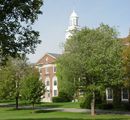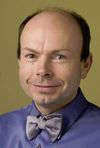Scanning probe microscopy in modern nanotechnology
Scanning Probe microscopy (SPM) is one of the major tools responsible for the emergence of what is called “Nanoscience and Nanotechnology”. Various high-resolution SPM techniques proved to be capable of probing local electrical, magnetic, chemical, mechanical, optical and thermal properties of matter at the nanoscale level as well as changing these properties in a controlled manner. We observe now a tremendous proliferation of the areas of SPM applications in condensed matter, materials science, chemistry, bioengineering and nanotechnology. Your contributions are invited in all areas of SPM techniques related to study materials and processes at nanoscale, in particular:
- Novel development of SMP techniques
- SPM in biological and biomolecular applications
- SPM in application to nanotechnology
This session will take place on the afternoon of Thursday, June 3rd, and all day on Friday, June 4th, in Kellas 101.
Session organizer
Prof. Igor Sokolov is professor of chemistry at Clarkson University, and director of the NanoBioLaboratory at Clarkson.
Session sponsor
This session is sponsored by Veeco, Inc., manufacturer of atomic force microscopes and other instruments for nanotechnology. Veeco provides the tools to make, measure and visualize today's world-changing technologies. From LED, solar, data storage, semiconductor and wireless to the frontiers of life science, materials science and nanotechnology, Veeco drives the tiny changes that change everything.Confirmed speakers
- Prof. Todd Gross, Chair, Department of Mechanical Engineering, University of New Hampshire.
- Prof. Zoya Leonenko, Waterloo Institute for Nanotechnology, University of Waterloo, Ontario.
- Prof. Andrew Pelling, Department of Physics, University of Ottawa.
- Prof. Terri Camesano,Dept. of Chemical Engineering, Worcester Polytechnic Institute.
- Dr. John Thornton (Veeco, Inc.)
- Prof. Chuan-Jian Zhong, Dept. of Chemistry, SUNY Binghamton.
- Dr.. Alexander Tselev, Oak Ridge National Laboratory, Oak Ridge, TN: "AFM-based Scannign Mirowave Microscopy and its application to studies of metal-insulator transition in VO2".
- Prof. Nancy A. Burnham, Dept. of Physics, Worcester Polytechnic Institute.
- Prof. Dawn A. Bonnell, Dept. of Materials Science & Engineering, University of Pennsylvania. Dr. Bonnell's presentation will be given by Dr. Matthew Brukman, a research associate in the Bonnell group.
Program
Thursday, June 3, 1:00 PM - 5:10 PM
- Scanning Probe Microscopy in Modern Nanotechnology
- Kellas 101
Organizer/Presider: Igor Sokolov
1:00 Introductory Remarks
1:10 217 Probing Complex Properties: From Atomic Defects to Biomolecules. Matt Brukman and Dawn Bonnell, The University of Pennsylvania
1:50 218 Understanding and Controlling Rotational Motion at the Single-Molecule Level. Heather L. Tierney, April D. Jewell, Ashleigh E. Baber, Erin V. Iski and E. Charles H. Sykes, Tufts University
2:10 219 Atomic Force Microscopy Study of Immunosensor Surface To Scale down Size of ELISA-Type Sensor. Dmytro Volkov1, Guinevere Strack2, Jan Halamek2, Evgeny Katz2 and Igor Sokolov1,2, (1)Clarkson University, (2)Clarkson University
2:30 220 The Role of Electrostatic Interactions in Biological Assemblies by Atomic Force Microscopy and Kelvin Probe Force Microscopy. Zoya Leonenko, University of Waterloo
3:10 Intermission
3:30 221 Effects of Melatonin on Amyloid Fibril Formation and Toxicity: Probing the Mechanism of Alzheimer’s Disease. Youngjik (Vince) Choi and Zoya Leonenko, University of Waterloo
3:50 222 Effect of Cholesterol and Cortisol on Phospholipid Membranes and Monolayers. Erin Faught1, Elizabeth Drolle1, Brad Moores2, Matt Vijayan1 and Zoya Leonenko1,2, (1)University of Waterloo, (2)University of Waterloo
4:10 223 Binding and Aggregation of Amyloid Peptide 1-42 on Lipid Membranes. Francis Hane1, Elizabeth Drolle1, Ryan Speller2, Jeff Brockhouse2, James Forrest2 and Zoya Leonenko1,2, (1)University of Waterloo, (2)University of Waterloo
4:30 224 Amyloid Plaque Formation on Charged Surface Studied by AFM and KPFM. Brad A. Moores1 and Zoya Leonenko1,2, (1)University of Waterloo, (2)University of Waterloo
4:50 225 Gently Lifting Gold’s Herringbone Reconstruction: Trimethylphosphine on Au(111). April D. Jewell, Heather L. Tierney and E. Charles H. Sykes, Tufts University
Friday, June 4, 8:30 AM - 12:00 PM
- Scanning Probe Microscopy in Modern Nanotechnology
- Kellas 101
Organizer/Presider: Igor Sokolov
8:30 Introductory Remarks
8:35 Sample-Independent Lateral Force Calibration. E. Anderson1, T. Esformes1, and N.A. Burnham1, Department of Physics, Worcester Polytechnic Institute, Worcester MA 01609
9:05 300 AFM-Based Scanning Mirowave Microscopy and Its Application to Studies of Metal-Insulator Transition in VO2. Alexander Tselev, Oak Ridge National Laboratory
9:45 301 Peak Force Tapping & Quantitative Mechanical Mapping with Single Molecule Resolution. John Thornton, Veeco Instruments
10:25 Intermission
10:40 302 AFM To Study Electron Photoemission from Single Quantum Dots for Solar Cells and Memory Applications. Nataliia Guz, Maxim Dokukin and Igor Sokolov, Clarkson University
11:00 303 Which Fractal Parameter Most Determines Adhesion?. Nancy A. Burnham1, Deli Liu1 and Jack Martin2, (1)Worcester Polytechnic Institute, (2)Analog Devices Inc
11:40 304 Atomic Force Microscopy To Detect Internal Live Processes in Insects. Maxim Dokukin1, Nataliia Guz1, Sergey Vasilyev1 and Igor Sokolov1,2, (1)Clarkson University, (2)Clarkson University
Friday, June 4, 1:30 PM - 5:30 PM
- Scanning Probe Microscopy in Modern Nanotechnology
- Kellas 101
Organizer/Presider: Igor Sokolov
1:30 Introductory Remarks
1:35 345 Morphological Evolution of Nanoparticles and Assemblies in Electrocatalytic and Electrochemical Processes. Chuan-Jian Zhong, Jin Luo, Linyang Wang, Bridgid Wanjala, Bin Fang, Rameshwori Loukrakpam, Jun Yin and Elizabeth Crew, State University of New York at Binghamton
2:15 346 Mechanisms of Material Transport in Field Assisted Nanopatterning. Todd S. Gross and Anjali Parkhi, University of New Hampshire
2:55 Intermission
3:10 347 Cells under the Tip. Andrew E. Pelling, University of Ottawa
3:50 348 AFM in Study of Cell Surface. Ravi Gaikwad1, Nataliia V. Guz1, Craig Woodworth2 and Igor Sokolov1, (1)Clarkson University, (2)Clarkson University
4:10 349 Micro-Environmental Tuning of Muscle Myoblast. Zeinab Al-Rekabi1 and Andrew E. Pelling1,2, (1)University of Ottawa, (2)University of Ottawa
4:30 350 Quantifying Bacterial Adhesion through AFM. Terri A. Camesano, Worcester Polytechnic Institute
5:10 351 Nanometer-Scale Mechanics of Distinct Microtubule Types. Zachary J. Donhauser, Vassar College








